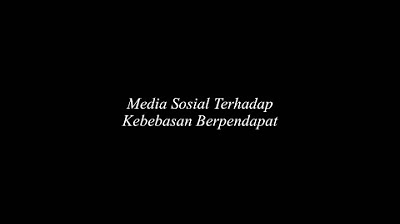Why You Don’t Want To Study (or do ANYTHING) After 4hrs of Youtube Binging
Summary
TLDRThe video script addresses the struggle of productivity amidst the lure of social media platforms like YouTube and TikTok. The speaker, who once battled with similar issues, shares a personal transformation story and offers practical advice to break free from the cycle of procrastination. The essence of the solution lies in becoming hyper-aware of one's thoughts, processing negative emotions through voice notes, and analyzing daily habits to set barriers against mindless scrolling. The speaker also emphasizes the impact of large corporations that design these platforms to be addictive, and suggests a self-improvement system that uses a point-based scoring method to encourage positive behaviors and discourage negative ones. By setting and achieving personal milestones, the video encourages viewers to shift their focus from short-term digital gratification to long-term personal growth and fulfillment.
Takeaways
- 😀 Spending excessive time on social media can lead to feelings of guilt and unproductiveness.
- 📉 Recognizing and processing negative thoughts is crucial for breaking the cycle of procrastination.
- 💡 Self-awareness and understanding one's thoughts are key to overcoming distractions.
- 🛠 Creating a self-improvement system can transform productivity habits.
- 🤔 Addressing the underlying reasons for procrastination helps in tackling the root cause of the issue.
- 🚀 Changing one's environment and routine can significantly improve focus and motivation.
- 📝 Tracking habits and setting clear goals are effective strategies to reduce social media usage.
- 🔍 Understanding how social media platforms are designed to capture attention can help in managing usage.
- 🎯 Setting positive milestones and aligning daily actions with long-term goals fosters personal growth.
- 👥 Engaging in meaningful activities like spending time with friends and exercising is a better way to relax than mindless scrolling.
Q & A
How many hours does the person in the transcript spend on social media platforms daily?
-The person spends an average of 7 hours daily on YouTube and TikTok.
What does the speaker suggest as the first step to overcome procrastination?
-The first step is to train oneself to become hyper-aware and learn to process thoughts.
What is the self-improvement system that the speaker and their friend created?
-The self-improvement system is a point-based scoring system that awards positive points for accomplishing daily goals and negative points for not adhering to them.
Why does the speaker say that simply telling oneself to 'just work' is not effective advice?
-It is not effective because it doesn't address the underlying negative thoughts and mental state that prevent someone from concentrating and being productive.
How does the speaker feel after spending hours on social media?
-The speaker feels worse, with a rush of negative thoughts and feelings of guilt for wasting time.
What is the second action point suggested by the speaker to regain control over one's life?
-The second action point is to deeply understand how one's attention is being stolen by social media platforms and to analyze and change one's habits and patterns.
What is the reason behind the speaker's belief that social media platforms are addictive?
-The speaker believes they are addictive because there are giant companies that invest heavily in studying our brains to figure out how to keep users on their platforms.
How does the speaker suggest changing one's habits regarding social media usage?
-The speaker suggests turning off notifications, setting timers on social media apps, and deleting some apps to create barriers that force a pause and reconsideration before using them.
What is the third and final thing the speaker did to end their social media addiction?
-The third thing is implementing the point-based system that aligns with their ideal self and setting milestones to work towards, which makes social media seem trivial and less appealing.
Why does the speaker believe that binging on social media is not a good way to relax?
-The speaker believes binging is not good because it is a waste of time and costly, and it does not address the need for relaxation in a healthy and productive manner.
What is the speaker's final advice for someone struggling with social media addiction?
-The speaker advises to proactively process emotions and actions, analyze habits and patterns, and set milestones and goals to work towards, which will make social media usage seem irrelevant.
Outlines

This section is available to paid users only. Please upgrade to access this part.
Upgrade NowMindmap

This section is available to paid users only. Please upgrade to access this part.
Upgrade NowKeywords

This section is available to paid users only. Please upgrade to access this part.
Upgrade NowHighlights

This section is available to paid users only. Please upgrade to access this part.
Upgrade NowTranscripts

This section is available to paid users only. Please upgrade to access this part.
Upgrade NowBrowse More Related Video

The 2024 Social Media Strategy That Works for Concrete Coatings and Home Improvement Contractors

Đã Có AI Tạo Bài Đăng Mạng Xã Hội Siêu Nhanh Để Bán Hàng, Tiếp Thị Liên Kết Tốt Hơn

Media Sosial Terhadap Kebebasan Berpendapat

How to redirect traffic to the 2nd WAN ( YouTube, Facebook, Tiktok,... )

Media Sosial dalam Pembelajaran ??? Bagaimana Peranan Media Sosial untuk Pendidikan

Social Media em 2024. O que estudar para ser um Social Media?
5.0 / 5 (0 votes)